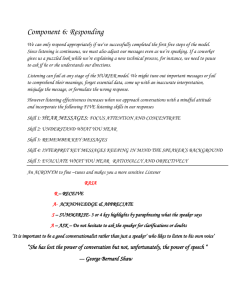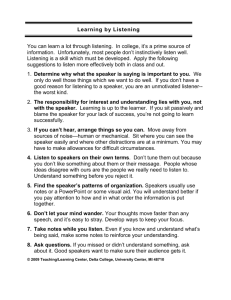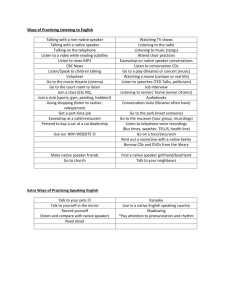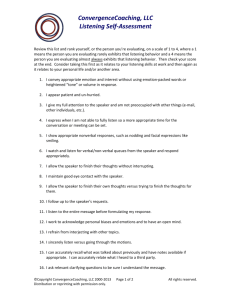143 -- IMPROVING YOUR LISTENING SKILLS
advertisement
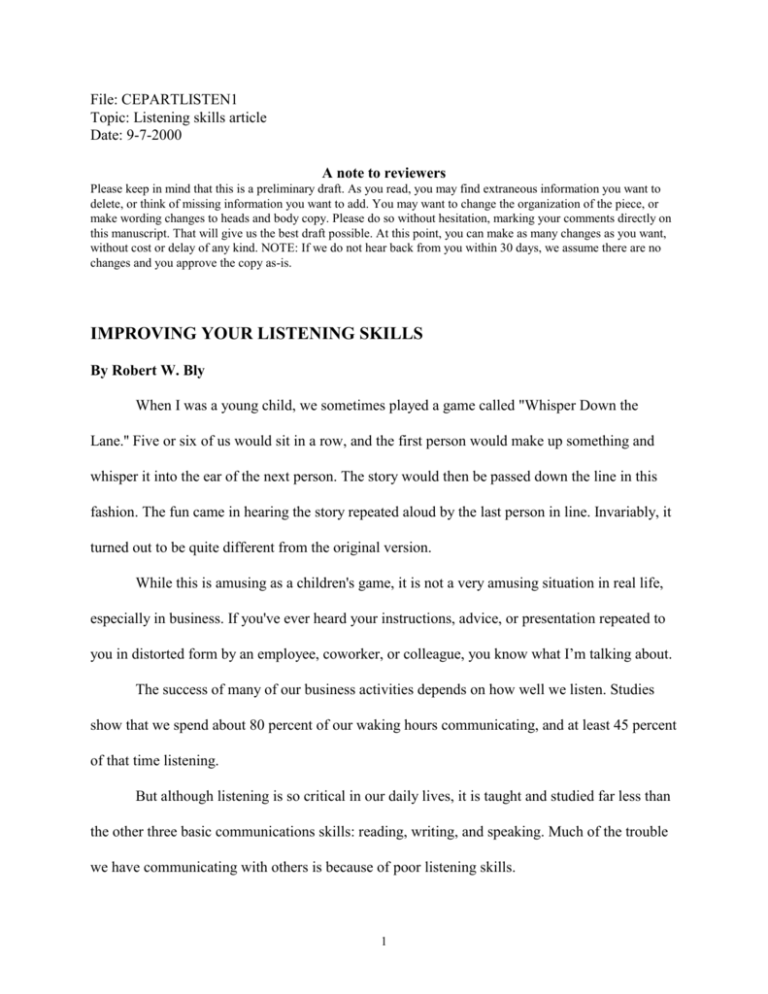
File: CEPARTLISTEN1 Topic: Listening skills article Date: 9-7-2000 A note to reviewers Please keep in mind that this is a preliminary draft. As you read, you may find extraneous information you want to delete, or think of missing information you want to add. You may want to change the organization of the piece, or make wording changes to heads and body copy. Please do so without hesitation, marking your comments directly on this manuscript. That will give us the best draft possible. At this point, you can make as many changes as you want, without cost or delay of any kind. NOTE: If we do not hear back from you within 30 days, we assume there are no changes and you approve the copy as-is. IMPROVING YOUR LISTENING SKILLS By Robert W. Bly When I was a young child, we sometimes played a game called "Whisper Down the Lane.'' Five or six of us would sit in a row, and the first person would make up something and whisper it into the ear of the next person. The story would then be passed down the line in this fashion. The fun came in hearing the story repeated aloud by the last person in line. Invariably, it turned out to be quite different from the original version. While this is amusing as a children's game, it is not a very amusing situation in real life, especially in business. If you've ever heard your instructions, advice, or presentation repeated to you in distorted form by an employee, coworker, or colleague, you know what I’m talking about. The success of many of our business activities depends on how well we listen. Studies show that we spend about 80 percent of our waking hours communicating, and at least 45 percent of that time listening. But although listening is so critical in our daily lives, it is taught and studied far less than the other three basic communications skills: reading, writing, and speaking. Much of the trouble we have communicating with others is because of poor listening skills. 1 The good news is that listening efficiency can be improved by understanding the steps involved in the listening process and by following these basic guidelines. Are You a Good Listener? Most people are not. Many years ago, Sperry (now UniSys) did a survey and found that 85 percent of all people questioned rated themselves average or less in listening ability. Fewer than 5 percent rated themselves either superior or excellent. You can come up with a pretty good idea of where you fall in this spectrum by thinking about your relationships with the people in your life: your boss, colleagues, subordinates, best friend, spouse. If asked, what would they say about how well you listen? Do you often misunderstand assignments, or only vaguely remember what people have said to you? If so, you may need to improve your listening skills. The first step is understanding how the listening process works. The Four Steps of Listening Hearing is the first step in the process. At this stage, you simply pay attention to make sure you have heard the message. If your boss says, "McGillicudy, I need the CAD drawings on my desk by Friday noon," and you can repeat the sentence, then you have heard her. The second step is interpretation. Failure to interpret the speaker's words correctly frequently leads to misunderstanding. People sometimes interpret words differently because of varying experience, knowledge, vocabulary, culture, background, and attitudes. A good speaker uses tone of voice, facial expressions, and mannerisms to help make the message clear to the listener. For instance, if your boss speaks loudly, frowns, and puts her hands on her hips, you know she is probably upset and angry. 2 During the third step, evaluation, you decide what to do with the information you have received. For example, when listening to a sales pitch, you have two options: you choose either to believe or to disbelieve the salesperson. The judgments you make in the evaluation stage are a crucial part of the listening process. The final step is to respond to what you have heard. This is a verbal or visual response that lets the speaker know whether you have gotten the message and what your reaction is. When you tell the salesperson that you want to place an order, you are showing that you have heard and believe his message. Become a Better Listener When it comes to listening, many of us are guilty of at least some bad habits. For example: Instead of listening, do you think about what you're going to say next while the other person is still talking? Engineers, thinking we know the answers and that managers do not, often tune out what non-technical speakers are saying. Are you easily distracted by the speaker's mannerisms or by what is going on around you? Do you frequently interrupt people before they have finished talking? Engineers, who value facts rather than feelings, often interrupt to set the listener straight, not realizing that the listener has a need to express himself fully, whether he is right or wrong. Do you drift off into daydreams because you are sure you know what the speaker is going to say? Engineers have a low tolerance level for people they assume have less knowledge than they do. 3 All of these habits can hinder our listening ability. Contrary to popular notion, listening is not a passive activity. It requires full concentration and active involvement and is, in fact, hard work. The following tips can help you become a better listener: 1. Don't talk. Listen. Studies show that job applicants are more likely to make a favorable impression and get a job offer when they let the interviewer do most of the talking. This demonstrates that people appreciate a good listener more than they do a good talker. Why is this so? Because people want a chance to get their own ideas and opinions across. A good listener lets them do it. If you interrupt the speaker or put limitations on your listening time, the speaker will get the impression that you're not interested in what he is saying -- even if you are. So be courteous and give the speaker your full attention. This technique can help you win friends, supporters, and sales. Says top salesman Frank Bettger, "I no longer worry about being a brilliant conversationalist. I simply try to be a good listener. I notice that people who do that are usually welcome wherever they go." 2. Don't jump to conclusions. Many people tune out a speaker when they think they have the gist of his conversation or know what he's trying to say next. Assumptions can be dangerous. Maybe the speaker is not following the same train of thought that you are, or is not planning to make the point you think he is. If you don't listen, you may miss the real point the speaker is trying to get across. 3. Listen "between the lines." Concentrate on what is not being said as well as what is being said. Remember, a lot of clues to meaning come from the speaker’s tone of voice, facial expressions, and gestures. People don't always say what they mean, but their body language is usually an accurate indication of their attitude and emotional state. 4 4. Ask questions. If you are not sure of what the speaker is saying, ask. It's perfectly acceptable to say, “Do you mean . . . ?”or “Did I understand you to say . . . ?” It's also a good idea to repeat what the speaker has said in your own words to confirm that you have understood him correctly. Sometimes we engineers cling to the mistaken notion that if it’s technical, we are expected to know it. But with the explosion of technology and information, that’s impossible. As Thomas Edison said, “We don’t know one millionth of one percent about anything.” The only way you learn is by listening and asking questions. 5. Don't let yourself be distracted by the environment or by the speaker's appearance, accent, mannerisms, or word use. It's sometimes difficult to overlook a strong accent, a twitch, sexist language, a fly buzzing around the speaker’s head, and similar distractions. But paying too much attention to these distributions can break your concentration and make you miss the point of the conversation. If outside commotion is a problem, try to position yourself away from it. Make eye contact with the speaker, and force yourself to focus on the message, not the environment. Keep an open mind. Don’t just listen for statements that back up your own opinions and support your beliefs, or for certain parts that interest you. The point of listening, after all, is to gain new information. Be willing to listen to someone else's point of view and ideas. A subject that may seem boring or trivial at first can turn out to be fascinating, if you listen with an open mind. Take advantage of your brain power. On the average, you can think four times faster than the listener can talk. So, when listening, use this extra brainpower to evaluate what has been said and summarize the central ideas in your own mind. 5 That way, you'll be better prepared to answer any questions or criticisms the speaker poses, and you'll be able to discuss the topic much more effectively. 6. Provide feedback. Make eye contact with the speaker. Show him you understand his talk by nodding your head, maintaining an upright posture, and, if appropriate, interjecting an occasional comment such as ''I see" or "that’s interesting" or "really.'' The speaker will appreciate your interest and feel that you are really listening. Motivation is an essential key to becoming a good listener. Think how your ears perk up if someone says, "Let me tell you how pleased I am with that report you did,'' or "I'm going to reorganize the department, and you are in line for a promotion. " To get the most out of a meeting, speech, or conversation, go in with a positive attitude. Say to yourself, "What can I learn from this to make me more valuable in my industry and to my company?'' You might be surprised at what you can learn, even from routine meetings and bull sessions at the water fountain. About the author: Bob Bly is the director of the Center for Technical Communication (phone 201-3851220; fax 201-385-1138; e-mail rwbly@bly.com), a Dumont, NJ-based consulting firm that helps engineers, managers, and other corporate employees improve their communication and interpersonal skills. Bob has presented seminars for numerous clients including Foxboro, IBM, Cardiac Pacemakers, Metrum Instrumentation, Medical Economics, U.S. Army, Arco Chemical, and Thoroughbred Software. He has written more than 100 articles and 45 books including 101 Ways to Make Every Second Count (Career Press). ### 6 7
